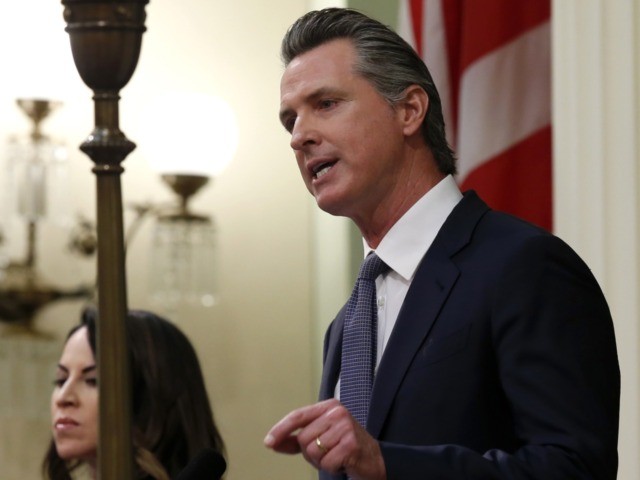California Governor Gavin Newsom admitted Wednesday in his second annual “State of the State” address to the legislature in Sacramento that homelessness is a “disgrace” in the Golden State, and laid out a plan to address it.
While touting California’s economic achievements and social progress, Newsom was compelled to acknowledge the glaring crisis.
As of last year, California was “entirely” responsible for the nation’s rising homelessness, according to figures from the U.S. Department of Housing and Urban Development.
Newsom said:
The California Dream is for all.
To that end, there are 1.6 million fewer Californians living in poverty today than in 2011—a full quarter of the nation’s decrease.
But no amount of progress can camouflage the most pernicious crisis in our midst, the ultimate manifestation of poverty: homelessness.
That’s why I’m devoting today’s remarks to this crisis.
Let’s call it what it is, a disgrace, that the richest state in the richest nation—succeeding across so many sectors—is failing to properly house, heal, and humanely treat so many of its own people.
Every day, the California Dream is dimmed by the wrenching reality of families, children and seniors living unfed on a concrete bed.
Military veterans who wore the uniform of our country in a foreign land, abandoned here at home.
LGBTQ youth fleeing abuse and rejection from their families and communities.
The governor did not blame specific state policies. Instead, he blamed “our country’s leaders and our nation’s institutions,” and suggested that people, in general, had ignored the needs of the poor.
But he said the state would step in. He noted that he had already used an executive order to provide “emergency mobile housing trailers and services for homeless families and seniors.”
He added that “excess state land” would be made available “to be used by local governments, for free, for homelessness solutions.”
And he called on the legislature to pass laws to make the permitting process easier for the construction of homeless shelters, and to exempt them from environmental review.
Newsom has typically focused on the idea of spending money to build housing as the key to addressing homelessness. But he largely ignored the challenges of mental illness and drug abuse.
That changed Wednesday. Newsom acknowledged that decades of mental health policy — across Democratic and Republican administrations from Kennedy to Reagan — had made it more difficult to compel people to be taken off the street and given medical care.
He proposed addressing that problem through new state laws and policies that would allow doctors to intervene:
California’s behavioral health laws may have been ahead of their time, but today, call out for reform.
We must tailor these policies to reflect the realities of street homelessness today, which are so different than they were 50 or even 15 years ago when these laws were enacted.
And while we made progress on limited and general conservatorships last year, further improvements are warranted.
All within the bounds of deep respect for civil liberties and personal freedoms—but with an equal emphasis on helping people into the life-saving treatment that they need at the precise moment they need it.
Newsom also declared that “we need to stop tolerating open drug use on our streets.”
He also pledged to work with the legislature on identifying new sources of funding for tackling homelessness. He hinted at ongoing tensions with the Trump administration, suggesting the federal government needed to provide some of the money: “Federal decision-making contributed to this moment and our federal government has an obligation to match its rhetoric with specific, constructive, and deliverable results.”
Gov. Newsom concluded: “I don’t think homelessness can be solved. I know homelessness can be solved. This is our cause. This is our calling.”
Joel B. Pollak is Senior Editor-at-Large at Breitbart News. He earned an A.B. in Social Studies and Environmental Science and Public Policy from Harvard College, and a J.D. from Harvard Law School. He is a winner of the 2018 Robert Novak Journalism Alumni Fellowship. He is also the co-author of How Trump Won: The Inside Story of a Revolution, which is available from Regnery. Follow him on Twitter at @joelpollak.

COMMENTS
Please let us know if you're having issues with commenting.